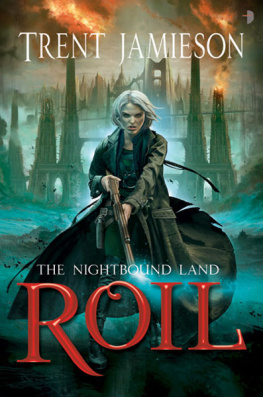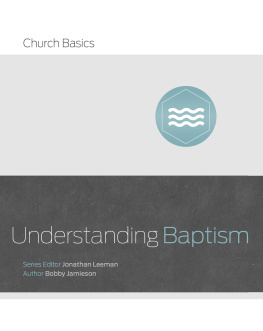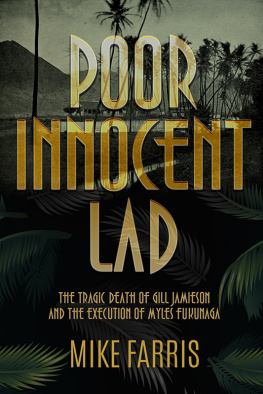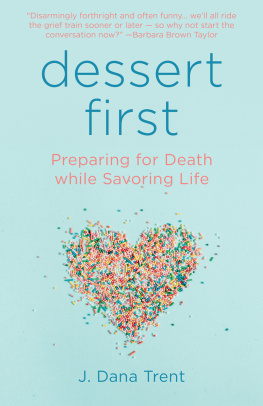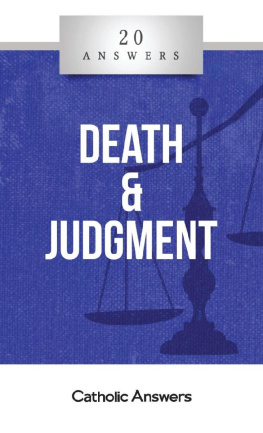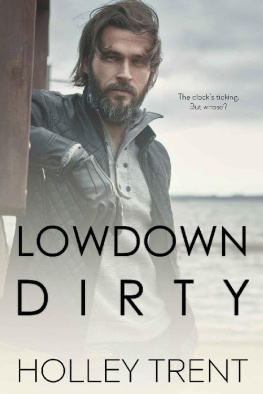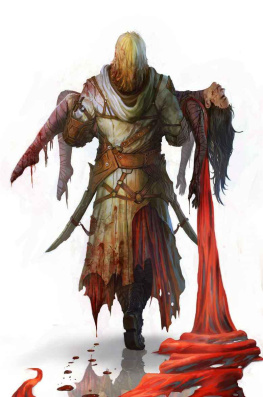Trent Jamieson - Managing Death: Death Works Trilogy
Here you can read online Trent Jamieson - Managing Death: Death Works Trilogy full text of the book (entire story) in english for free. Download pdf and epub, get meaning, cover and reviews about this ebook. genre: Detective and thriller. Description of the work, (preface) as well as reviews are available. Best literature library LitArk.com created for fans of good reading and offers a wide selection of genres:
Romance novel
Science fiction
Adventure
Detective
Science
History
Home and family
Prose
Art
Politics
Computer
Non-fiction
Religion
Business
Children
Humor
Choose a favorite category and find really read worthwhile books. Enjoy immersion in the world of imagination, feel the emotions of the characters or learn something new for yourself, make an fascinating discovery.

- Book:Managing Death: Death Works Trilogy
- Author:
- Genre:
- Rating:5 / 5
- Favourites:Add to favourites
- Your mark:
- 100
- 1
- 2
- 3
- 4
- 5
Managing Death: Death Works Trilogy: summary, description and annotation
We offer to read an annotation, description, summary or preface (depends on what the author of the book "Managing Death: Death Works Trilogy" wrote himself). If you haven't found the necessary information about the book — write in the comments, we will try to find it.
Managing Death: Death Works Trilogy — read online for free the complete book (whole text) full work
Below is the text of the book, divided by pages. System saving the place of the last page read, allows you to conveniently read the book "Managing Death: Death Works Trilogy" online for free, without having to search again every time where you left off. Put a bookmark, and you can go to the page where you finished reading at any time.
Font size:
Interval:
Bookmark:
Death Works
Death Most Definite
Managing Death
Look out for:
The Business of Death
S o Book Two. Whod have thought?
Once again, for the last stages (after the big grub of a first draft), a huge thank you to my publisher Bernadette Foley, my structural editor Nicola OShea and my copy-editor Roberta Ivers. This was foreign ground to me, and youve made the whole process a lot less scary than it could have been. If the books a butterfly its because of the chrysalis you lot wove maybe Im taking that metaphor too far.
Thanks again to everyone at Avid Reader Bookstore (and the cafe) for being amazing, and for still putting up with the least available casual staff member in the universe, and to Paul Landymore, my SF Sunday compadre who never lets me get away with much. Thanks also to the city of Brisbane, with whom I have taken even more liberties particularly concerning her bridges and to my Aunty Liz, who isnt going to like the swearing but switched me on to fantasy when I was a very young lad. All those Greek myths and tragedies: you cant get a better gift than that.
Thanks to Diana, who has to put up with everything, and still loves me.
And thanks to you, who have followed me onto Book Two. I hope you liked it.

Trent Jamieson is a writer and editor and has published over seventy short stories, two of which have won prestigious Aurealis Awards. He also teaches creative writing, and has recently taught on the highly regarded Clarion South program, the professional development course for genre writers. He lives with his wife, Diana, in Queensland, Australia.
Find out more about Trent Jamieson and other Orbit authors by registering for the free monthly newsletter at www.orbitbooks.net
if you enjoyed
MANAGING DEATH
look out for
by
Marjorie M. Liu
When I was eight, my mother lost me to zombies in a one-card draw.
It was not her fault. There was a blizzard. Six hours until sunset, lost on a twisting county road. Bad map. No visibility. Black ice, winds howling down.
I remembered. Slammed against my seat belt. Station wagon plowing into a drift, snow riding high as my window. Metal crunching: the edge of the bumper, the front tire, my door. Beneath us, a terrible reverberating crack.
Lodged. Busted. Dead on our wheels. More than dead. My mother showed me spikes packed into the snow and ice. Tiny metal stars, so sharp the points pricked my palm when I bent to touch one. She pointed out the tires, torn into scrap, ribbons of rubber. Told me not to worry. Called it a game.
My mother cleared the road behind us. I watched from the car. Face pressed against the cold window, fogging glass. She juggled stars and spikes for me, and did not wince when the sharp points bounced off her tattooed hands. She danced in the falling snow, eyes shining, cheeks flushed with the blood of roses, and when I could no longer bear to sit still, I joined her and she held my wrists and swung me in great circles until we fell down.
I remembered her laughter. I remembered.
I remembered that I did not want to go with her. I wanted to stay with the car. I wanted to stay home with the wreck. Listen to the radio. Play with my dolls. My mother would not let me. Too dangerous. Too many weirdos. I was too little to handle the twelve-gauge stashed beneath the passenger seat, or even the pistol in the glove compartment; and the boys were still asleep. Anything could happen.
So we bundled up. Slogged backward in the dull silence of snow and the endless winter bones of the white forked trees. My mother carried me on her back. I saw: silver clouds of my breath engulfing the tattoos on her neck; that lazy red eye, Zee, tracking my face in his dreams. I felt the bulge of knives beneath her black wool coat, too light and short for a blizzard, for anyone but a woman who did not feel the cold. I heard the song she sang over the crunching beat of her boots on the empty road. Folsom Prison Blues. Voice like sunshine and the rumble of a slow train.
A mile behind us, some local bar. Lonely way station. Out in the middle of nowhere, just a shed, neon lights shaped like a naked woman flickering on and off through the dirty tinted glass. Nipples winking. Pickup trucks in the narrow, shoveled, salted lot. Scents of fried food and burned engine oil in my nostrils.
My mother hesitated when she saw the place, just as she had hesitated earlier when we passed it in the car. Wavered, shoulders hitching. Both of us covered in snow. I could not see her face, but I felt her tension. Breathed it. Looked down and saw Zee struggling sleepily against her skin. Tattoos begging to peel.
We entered the bar. My mother let the door slam shut behind us. I could not see: too dark, too smoky, loud with laughter and rocky music. Warm as an oven compared to the blizzard chill. I clung, face pressed to my mothers neck. She did not move. She did not speak. She stood with her back to the door, so very still I could not feel her breathe, and all around us those voices faded dead within a hush, and the music, the low, rolling wail of electric guitar, snapped, stopped. Silence descended. Slow, cold, heavy as snow. Pregnant a word I would have used. Expectant, full, with something living and turning, gestating, in that dark smoky womb.
Hunter Kiss, said a deep low voice. Lady Hunter.
I peered over my mothers shoulder, past the loose black curls of her snow-riddled hair. She squeezed my leg. I did not listen. I could not help myself.
It was still difficult to see. Just one lamp on the bar, casting a glow, a ring of fire that did not touch the handful of men and women scattered like fleas in the smoky shadows. Still. Poised. Coiled. Dressed in flannel, jeans, weighed down with thick overcoats, dull and torn. Hats pulled low. Eyes like old wells dark, hollow, with only a glint of reflected light at the very bottom of their gazes. Auras black as pitch. Anchored and straining. As though crowns of ghosts rested upon their heads.
Only one man stood before my mother. He wore a blue suit and a striped tie that shimmered like the steel in his shadowed eyes. Wavy blond hair. Square jaw. Handsome, maybe. Handsome devil. Zombie.
All of them, zombies. Human shells. Living. Breathing. Possessed.
My mother made me slide to the floor. I clutched the hem of her coat. I tried to be small. I knew danger. I knew threats. I knew a demon when I saw one.
My mother raised her hand. Metal sparked between her tattooed fingers. A star from the road. Bristling with spikes. The zombie smiled. He also raised his hand. In his palm, a deck of cards.
All we want is a look, he said. Just one. You know how it is.
I know enough. Her voice was so cold. She could not be the same woman, not mine, not my mother. Her hand tightened around the spikes, which dug into her skin but did not puncture, no matter how hard she squeezed. I watched her hand, the straining tendons. I heard metal groan.
The zombies smile widened. One-card draw. Highest wins.
If I refuse?
Now or later. You know the rules.
You pervert them, said my mother. You pervert this world.
We are demon, said the zombie simply, and stepped sideways to the battered bar, its surface scarred and mauled by years of hard elbows and broken glass. Ashtrays overflowed. Bottles clustered. Everything, sticky with fingerprints; even the air, marked, cut with smoke and sweat.
My mother watched the zombie. She watched them all and shrugged her shoulders. Her jacket slid off slowly, falling on the floor beside me. She wore little. A tight white tank top, a harness for her knives. Silver tattoos roped down her arms, glinting red. Eyes. Open and staring.
Font size:
Interval:
Bookmark:
Similar books «Managing Death: Death Works Trilogy»
Look at similar books to Managing Death: Death Works Trilogy. We have selected literature similar in name and meaning in the hope of providing readers with more options to find new, interesting, not yet read works.
Discussion, reviews of the book Managing Death: Death Works Trilogy and just readers' own opinions. Leave your comments, write what you think about the work, its meaning or the main characters. Specify what exactly you liked and what you didn't like, and why you think so.

